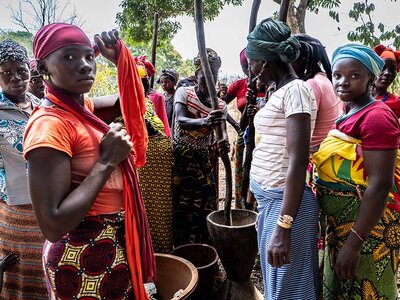Sierra Leone
- 78%
- of people are food insecure
- 26.2%
- of children are stunted
- 300,000
- children receiving school meals each day
Sierra Leone is a small but densely populated country on the North Atlantic coast of West Africa, ranked 185th out of 193 countries in the 2025 Human Development Index.
Food insecurity has been exacerbated by global inflation, the economic effects of the Ukraine crisis, and the lingering impacts of COVID‑19.
Agriculture employs over 60 percent of the population, largely smallholder farmers relying on subsistence and rain‑fed practices. However, the sector is dominated by smallholder farmers relying on subsistence practices, with limited access to improved seeds, fertilizers and modern techniques. Declining soil fertility and erratic weather patterns further reduce yields, threatening food production.
Climate change increases the frequency of floods, droughts, and coastal erosion, threatening livelihoods and food production. Sierra Leone has faced repeated climate shocks, including devastating floods in 2022, 2023, and 2024 displacing thousands and damaging crops.
A large proportion of the population experiences food insecurity. Limited access to improved agricultural inputs and technologies constrains productivity. Rising food, fuel, and fertilizer prices reduce household purchasing power.
Child stunting (impaired growth due to malnutrition) remains high and is classified as a serious public health concern.
The World Food Programme provides food, cash transfers, nutrition support and capacity strengthening, with a focus on empowering women smallholder farmers and improving school meals programme. Key priorities include enhancing national readiness for climate-related emergencies and reinforcing food and nutrition security by developing sustainable agricultural practices and strengthening local food systems.
What the World Food Programme is doing in Sierra Leone
-
Emergency response
-
WFP works with the Ministry of Social Welfare and the National Disaster Management Agency to ensure that crisis-affected people can meet their food and nutritional needs and are supported in recovering from shocks. The primary objective of this activity is to save lives and protect livelihoods. To mitigate the impact of high food prices on the most vulnerable people, WFP provide cash transfers to cover the needs of people who regularly go without enough nutritious food.
-
Home-grown school feeding
-
Malnutrition prevention
-
Promoting local nutritious foods
-
Supporting smallholder farmers
Sierra Leone news releases
Go to pagePartners and donors
Find out more about the state of food security in Sierra Leone
Visit the food security analysis pageOperations in Sierra Leone
Contacts
Office
6A Renner Drive Off Wilkinson Road P. O. Box 1011
Freetown
Sierra Leone







